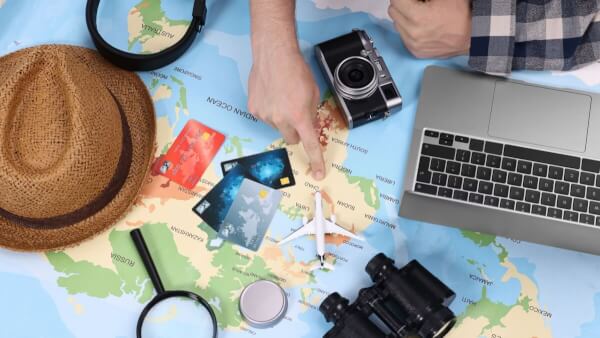Complete Guide to Traveling to Europe from New Zealand: Everything you need to know [2025]
Prepare for your European journey from New Zealand with insights on flights, visas, and top destinations.

Planning a trip from New Zealand to Fiji this year? The island country just a few hours away in the South Pacific Ocean is perfect for taking in tropical beaches and a rich and unique culture with warm hospitality.
The great news is that Fiji’s visa-free policies make travel incredibly convenient for NZ citizens. This guide will explore everything you need to know before hopping on a short-haul flight to the ‘Soft Coral Capital of the World’. We'll also introduce the Wise travel card – your perfect companion for managing expenses on your travels abroad. Wise offers the mid-market exchange rate with no markups and transparent fees to help save on international transactions.
| Table of contents |
|---|
Fiji is a popular destination for New Zealanders due to its visa-free travel. You can visit the country for up to four months for recreational and tourist purposes without a visa1. All you need is a passport valid for six months from your arrival date.
New Zealand is listed as one of the visa-exempted countries on Fiji’s official immigration website. This makes the task of arranging your stay on the archipelago easier as you won’t have to apply for any official documentation beforehand. Visitors from New Zealand can stay in Fiji for a maximum of four months without a visa.
You are defined as a tourist on holiday if you intend to:
While you won’t need a visa for short to medium-term stays, all visitors must get a visitors permit. This is issued on arrival2.
However, you can’t use a visitors permit to work or look for employment during your stay. For this, you will need to apply for a short-term or long-term work permit. You will also need a study permit for any form of education at local institutions or universities in Fiji.
If you are a non-New Zealand citizen with a residence permit, you will qualify for visa-free travel if you hold a passport from one of the exempted countries. As of February 2025, citizens from 141 countries can enter Fiji without a visa and stay in the country for up to 4 months3.
Check Fiji’s official list to see if you qualify.
While there aren’t any visa requirements for visits to Fiji, you will still need to apply for a relevant permit if you want to work or study in the country.
Work permits are categorised as either short-term for 1 year or less, and long-term for 3 years or more4. To apply for a work permit, you must present additional paperwork, including an employment contract and payment remittance.
A student permit is issued for up to three years and requires an acceptance letter from a school or institution and other supporting documents.
Check the full list of immigration services for permit requirements in Fiji.
Any citizen from New Zealand or one of the visa-exempted countries requires a permit to stay in Fiji for longer than 4 months.
Non-New Zealand citizens with a passport from a country not on the exempted list must apply for a visa before travelling. Here’s a quick step-by-step guide:
Tropical climes and white-sand beaches are only a short-haul flight away for New Zealanders. Several airlines operate direct flights to Fiji, making travel easy and accessible.
The most popular route is from Auckland Airport to Nadi International Airport, which takes around 3 hours. Jetting off from Christchurch International Airport to the same destination takes a little longer at 4 hours and 5 minutes.
Most international flights are directed to Nadi due to its drier, more temperate climate and larger airport compared to the capital, Suva.
Airlines that offer direct flights from New Zealand to Fiji include:
When entering Fiji, you will receive a passenger arrival card that will allow you to make any declarations for any dutiable, restricted, or prohibited goods. You must tick ‘yes’ in the Customs Section of the arrival card when bringing in items that you need to declare5.
Customs rules are enforced by the Fiji and Revenue Customs Service.
Items that are strictly prohibited include:
You will need relevant licenses and permits to bring in restricted items such as firearms, fireworks, methylated spirits, and radio communication equipment6. Check the complete list of prohibited and restricted goods before travelling to Fiji so you are fully aware of what you can and cannot import.
Fiji also enforces strict rules for food products and plants. You must declare items including raw or cooked food, dried fruits and vegetables, potted and bare-rooted plants, and any biological specimens. Biosecurity officers will inspect these on arrival7.
You won’t have to declare any personal belongings, though. The duty free allowances for goods for Fiji are as follows:
You must also declare and complete a Border Currency Reporting form when carrying more than 10,000 FJ or the foreign currency equivalent when entering the country.
You need to present several documents for immigration clearance when arriving in Fiji. When packing for your adventure abroad, make sure you have the following at hand:
There are no mandatory health certificates for arrivals. However, it’s always a good idea to print off a copy of your travel insurance policy for proof of coverage in case of medical emergencies and other unforeseen events.
Once you’ve got your permits and customs checks sorted, it’s time to start thinking about some everyday necessities for your time in Fiji.
One thing you won’t have to worry about is travel adapters — Fiji uses the same Type 1 plug as New Zealand. You don’t need any specific chargers, but remember to bring a power bank to charge your devices for longer days.
Before you go, double-check your mobile plan to see if you can take advantage of international roaming to use data, calls, and texts in Fiji. This is likely to incur an additional charge, though. It might be best to opt for an eSIM or local prepaid card to keep costs down.
For reliable network coverage, opt for eSIMS from Saily, GigSky, Arialo or Nomad. You can also buy a local SIM when you arrive at the airport, or from authorised resellers and retail stores in Fiji.
Also make sure you pack in:
The New Zealand government advises that medical services can be limited in Fiji. That’s why it’s important to take out comprehensive travel insurance with provisions for medical evacuation by air in case of emergencies.
Check our in-depth blog on the best travel insurance in New Zealand to find the best policy before you travel.
Make your money go further during your time in Fiji by following these finance tips.
The local currency in Fiji is the Fijian dollar (FJD). Carrying some cash is recommended if you plan on visiting smaller villages or buying goods and services from local vendors. When carrying cash, use a money belt or hidden pockets in bags to lower the risk of it getting stolen. For some helpful tips, check out our guide to avoiding foreign ATM fees when traveling abroad 📹
Your NZD debit and credit cards are a convenient option for spending in Fiji. Most major card networks are accepted. Unfortunately, Fiji is not included in the list of countries and regions that support Apple Pay8. You also won’t be able to make contactless payments with Google Wallet, though you can pay online or in mobile apps in Fiji using the service9.
You will also need to be mindful about foreign transaction fee and markups on currency exchange rates with your providers - which can put a dent in your finances if you plan on making multiple purchases a day.
Using a multi-currency travel card such as Wise is an excellent alternative with transparent exchange rates and low fees. Available for residents of New Zealand and supported countries, Wise offers the mid-market rate on currency conversions, which is the usually the same rate you see on Google, ensuring that you don’t lose money to extra fees or hidden mark-ups.
Wise offers a convenient travel card and money transfer services that make managing your finances abroad a breeze. The Wise card lets you spend like a local in over 150+ countries.
Here's why Wise is a great choice for your international travels:
Please see terms of use and product availability for your region or visit Wise fees and pricing for the most up to date pricing and fee information.
Sources:
*Please see terms of use and product availability for your region or visit Wise fees and pricing for the most up to date pricing and fee information.
This publication is provided for general information purposes and does not constitute legal, tax or other professional advice from Wise Payments Limited or its subsidiaries and its affiliates, and it is not intended as a substitute for obtaining advice from a financial advisor or any other professional.
We make no representations, warranties or guarantees, whether expressed or implied, that the content in the publication is accurate, complete or up to date.

Prepare for your European journey from New Zealand with insights on flights, visas, and top destinations.

Planning to use your ANZ debit card overseas? Learn about transaction fees, ATM withdrawal charges, and tips for saving money while traveling abroad.

Planning to use your Kiwibank debit card overseas? Learn about transaction fees, ATM withdrawal charges, and tips for saving money while traveling abroad.

Discover the countries New Zealand passport holders and permanent residents can visit without a visa. Plan your next hassle-free international trip today.

Explore the best debit cards for overseas travel. Learn about fees, features, and how to choose the right card for your adventures.

Discover the best credit cards for earning Airpoints in New Zealand, and how you can maximize the airpoints to make the most of your travels.